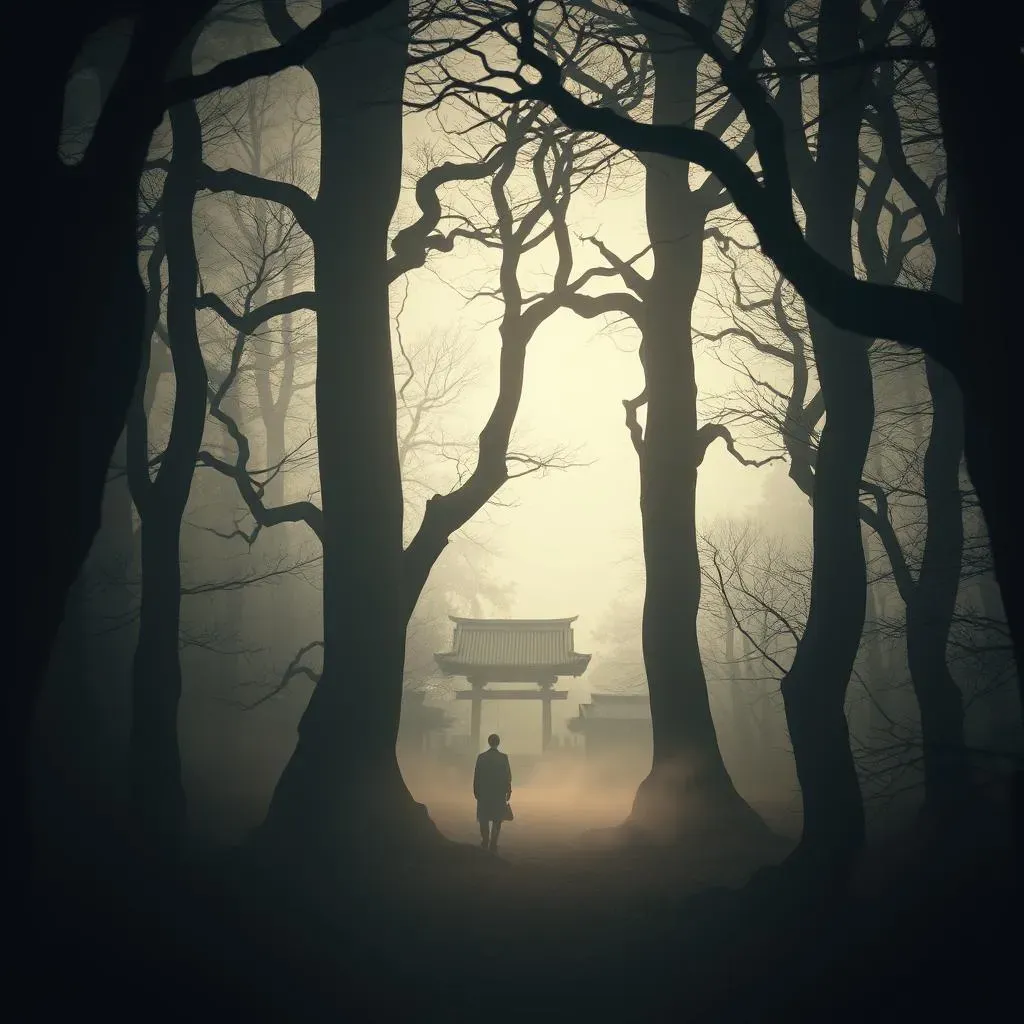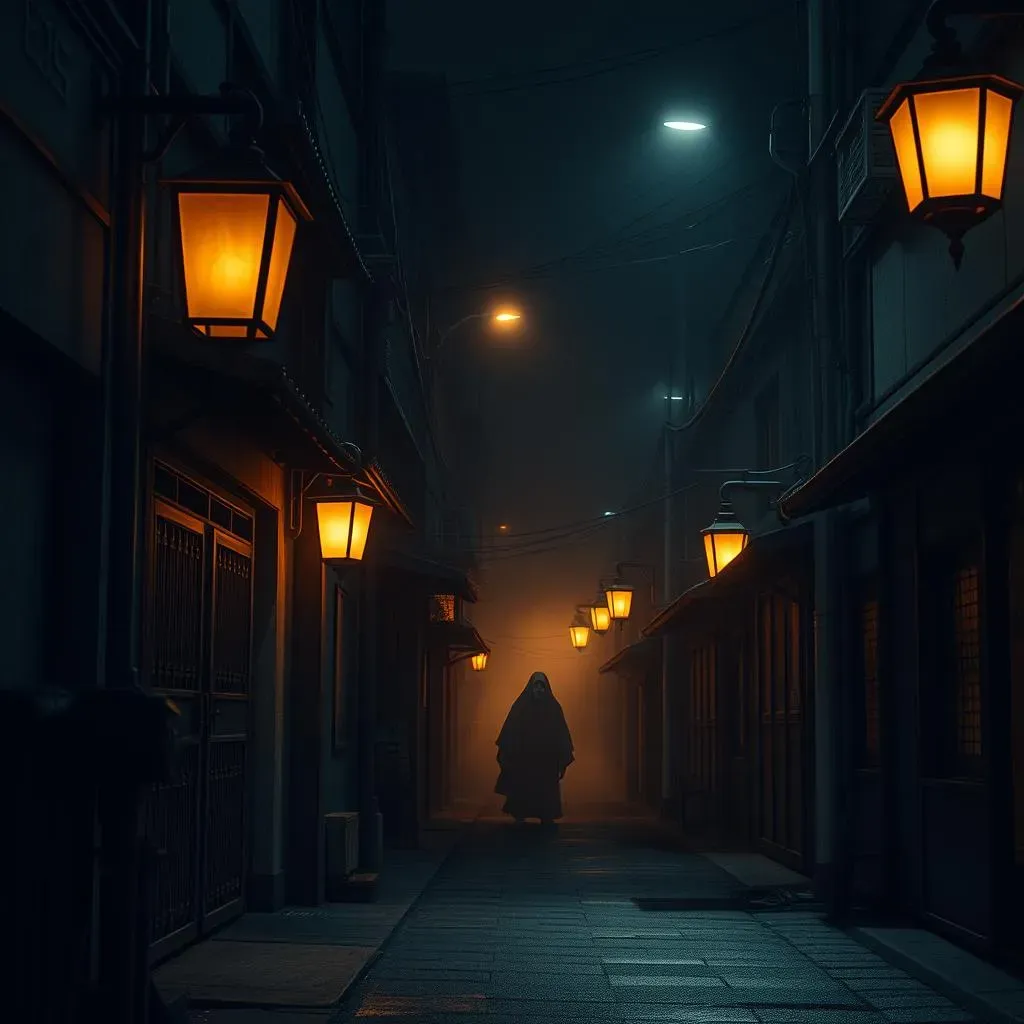Table of Contents
Ever heard a story that made your skin crawl, a tale whispered as truth, even though it sounded totally unbelievable? That's the magic of urban legends. Now, imagine those stories, but with a Japanese twist. We're talking about real Japanese urban legends, not just made-up campfire stories, but tales that have been passed down, evolving in the bustling cities and quiet corners of Japan. From bizarre real-life events that morphed into modern myths, like department store tragedies becoming cautionary tales, to eerie supernatural encounters with vengeful spirits and strange creatures lurking in the shadows, Japanese urban legends are a unique blend of history, culture, and spine-tingling fear. We will explore the spectrum of these fascinating stories, from grounded-in-reality events to full-blown ghostly encounters and even internet-age creepypastas. Get ready to explore the chilling world of real Japanese urban legends and find out why these stories continue to haunt and fascinate people around the globe.
Natural Japanese Urban Legends: When Reality is Strange Enough
Natural Japanese Urban Legends: When Reality is Strange Enough
Shirokiya Department Store Deaths: A Legend Takes a Plunge
Sometimes, the scariest stories aren't about ghosts, but about real events that get twisted and turned into legends. Take the story of the Shirokiya Department Store fire in 1932. It's a grim piece of Tokyo's history where a fire broke out on the upper floors. Now, here's where the "legend" part kicks in: rumor has it that some women in kimonos, faced with flames and smoke, chose to jump to their deaths rather than risk the immodesty of their kimonos flipping up in the wind as firefighters tried to rescue them from below with nets. Talk about a terrible choice!
The "Kimono Modesty" Myth: Fact or Fiction?
The dramatic image of women prioritizing modesty over their lives is a powerful, if disturbing, story. It spread like wildfire, becoming a key part of the Shirokiya fire legend. But hold on, historians and researchers have poked holes in this version. While the fire was absolutely real and tragic, with many lives lost, there's little evidence to support the "modesty jump." In fact, it seems firefighters actually encouraged women to jump into nets, and department store management later said they implemented "western-style" clothing policies partly because of this event. So, the legend of the Shirokiya fire isn't just about a disaster; it's about how we sometimes add layers of cultural interpretation, even questionable ones, to real tragedies, turning them into something almost unrecognizable.
Legend Element | Reality Check |
|---|---|
Women jumped to avoid kimono immodesty. | Likely a myth; little evidence to support it. |
Fire at Shirokiya Department Store in 1932. | True and tragic event. |
"Western-style" clothing policies implemented after. | Potentially true, possibly influenced by the fire and public perception. |
Supernatural Real Japanese Urban Legends: Ghosts and Goblins Among Us
Supernatural Real Japanese Urban Legends: Ghosts and Goblins Among Us
Vengeful Spirits: When Anger Lingers
so real life tragedies turning into legends are creepy, but what about straight-up ghost stories? Japan's got a whole bunch, and many of them revolve around the idea of vengeful spirits, or onryō. These aren't your friendly Casper-type ghosts. We're talking about spirits fueled by intense anger, sadness, or a desire for revenge. Think wronged women, betrayed warriors, or anyone who died with a serious grudge. These onryō are said to stick around, causing all sorts of trouble for the living until their issues are somehow resolved – or at least acknowledged.
Kuchisake-onna: Smile for the Slit-Mouthed Woman
Let's talk about Kuchisake-onna, the Slit-Mouthed Woman. This is one seriously unsettling urban legend. Picture this: a woman wearing a surgical mask approaches you on a foggy night. Kind of normal in some places, right? Then she asks, "Am I beautiful?" No matter what you answer, things go south fast. If you say "no," she might kill you on the spot. If you say "yes," she removes her mask to reveal a Glasgow smile – a mouth slit ear-to-ear – and repeats the question. Run! The legend says she was mutilated by a jealous husband, and now she roams around, especially at night, looking for victims. Some versions say offering her hard candy might distract her long enough to escape. Worth keeping a candy stash handy, maybe?
Legend | Key Features | Danger Level | Escape Strategy (Maybe) |
|---|---|---|---|
Kuchisake-onna (Slit-Mouthed Woman) | Masked woman, asks "Am I beautiful?", slit mouth | High - potential for being cut or killed | Hard candy, confusing answers, or running away fast |
Onryō (Vengeful Spirits) | Spirits driven by rage or sadness, seek revenge | Variable - can cause misfortune, illness, or death | Resolution of their grievance, appeasement rituals |
Teke Teke: The Torso with a Need for Speed
Ever heard a scratching sound that just makes your blood run cold? Then you might have Teke Teke nearby. This legend is about a girl who fell (or was pushed) onto train tracks and was cut in half by a train. Gruesome, right? Now, her vengeful spirit is said to crawl around on her elbows, making a "teke teke" sound as she moves – hence the name. If she catches you, legend says she'll slice you in half to match her own condition. Moral of the story? Be careful near train tracks, and maybe wear earplugs just in case you hear any suspicious "teke teke" sounds at night. You can never be too safe when it comes to Japanese urban legends.
Modern Real Japanese Urban Legends: Tales for the Digital Age
Modern Real Japanese Urban Legends: Tales for the Digital Age
Digital Age Terrors: From Chain Emails to Creepy Websites
so ghosts in bathrooms and slit-mouthed ladies are spooky, but what about scares that are totally wired? Yep, real Japanese urban legends have gone digital, big time. Think about it, stories always change with the times, right? Back in the day, it was all about dark forests and lonely roads. Now? It's glowing screens and endless internet rabbit holes. These modern legends tap into our fears about technology, privacy, and who – or what – might be lurking on the other side of the screen. And trust me, some of them are seriously freaky.
Why Real Japanese Urban Legends Still Terrify and Fascinate
Why Real Japanese Urban Legends Still Terrify and Fascinate
Echoes of Culture: More Than Just Jump Scares
So, why do real Japanese urban legends stick with us? It's not just about cheap scares. These stories are like little mirrors reflecting Japanese culture and history. Think about it, vengeful spirits? That's tied into deep-rooted beliefs about ancestors and the spirit world. Tales of social anxieties? Japan's always been a place with strong social rules and pressures. Even the tech-related terrors? That shows how Japan is both super advanced and maybe a bit worried about where tech is taking us. These aren't just random spooky tales; they're cultural snapshots wrapped in fear.
Tapping into Universal Fears: We're All a Little Scared Inside
Beyond the cultural stuff, real Japanese urban legends hit on fears we all have, no matter where we're from. Fear of the unknown? Yep, check out any ghost story. Fear of technology getting out of control? Hello, internet horror. Fear of being alone, of being hurt, of things lurking in the dark? These legends play on those primal feelings. It’s like they’re whispering, "Hey, remember that thing you're secretly terrified of? Yeah, it's real." And that, my friends, is universally creepy.
Reason for Enduring Fascination | Example Legend Element |
|---|---|
Cultural Reflection | Vengeful spirits (onryō) reflecting ancestor beliefs |
Universal Fears | Kuchisake-onna embodies fear of disfigurement and strangers |
Adaptability | Legends evolving into digital forms like the Red Room Curse |
Entertainment Value | Thrill of being scared in a controlled environment |
Legends Never Die: Evolving with the Times
Here's the really cool – and slightly unsettling – thing about real Japanese urban legends: they don't stay stuck in the past. They morph, they adapt, they find new ways to scare us. Think about how stories like Teke Teke or Kuchisake-onna started as whispers and now they're all over the internet, in movies, in video games. The Red Room Curse? That's pure internet-age terror. These legends keep changing clothes, putting on new masks, but the creepy heart of the story stays the same. They're like horror shape-shifters, always finding a way to crawl into our nightmares, no matter how much the world changes.
The End? Or Just the Beginning of the Legend?
So, we've journeyed into the weird and wonderful world of real Japanese urban legends. From slightly spooky true events twisted into something more, to full-on ghost stories that make you want to sleep with the lights on, these tales are definitely something. They show us that sometimes, truth is stranger than fiction, and that maybe, just maybe, there's a little bit of the supernatural lurking around every corner. Whether you believe in Kuchisake-onna or think the Colonel's Curse is just a funny coincidence, these legends are a cool peek into Japanese culture and the things that scare and fascinate people. Now, go forth and maybe share a legend or two – just don't blame me if you hear a strange knocking at your door tonight.
